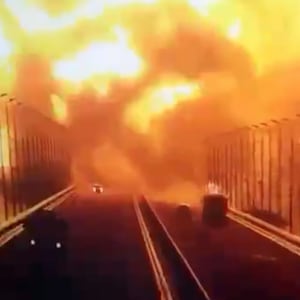The only bridge linking Russia to the occupied Ukrainian peninsula of Crimea was damaged by explosions on Monday in an act that Russian officials quickly blamed on Kyiv.
Traffic was halted across the 12-mile bridge over the Kerch Strait in the wake of the blasts in the early hours. Russia’s National Antiterrorism Committee (NAC) released a statement on Monday calling the incident a “terrorist attack” conducted by Ukraine’s fleet of marine drones and said a criminal case has been launched. They said two people were killed.
“At 03:05, two Ukrainian unmanned surface vehicles attacked the Crimean Bridge,” the NAC said. “As a result of the committed terrorist act, the road component of the Crimean bridge was damaged. Two adults were killed and one child was injured.”
The Baza telegram account shared videos appearing to show the damage to the bridge, with part of the closed roadway precariously tilting toward the water below.
It added that emergency services were at the scene and that the Investigative Committee of Russia opened a case under national terror legislation.
Ukraine has yet to officially comment on the explosions, which could severely hamper Russia’s logistical links to Crimea, which has served as a major military hub for the invasion.
“Today’s attack on the Crimean bridge is a special operation of the SBU and the navy,” a Ukrainian security service source told the French news agency AFP. They said it was carried out by marine drones. “It was difficult to reach the bridge, but in the end it was possible to do it.”
“The bridge has gone to sleep again,” the SBU Telegram account posted.
As well as holding crucial strategic significance as a supply for Russian President Vladimir Putin’s invasion, the bridge is similarly important as a symbol of his hold over the region. Following the illegal annexation of Crimea in 2014, Putin ordered the construction of the bridge—the longest in Europe—to permanently cement the link between the seized peninsula and Russia’s mainland. He personally drove a truck over the bridge at its completion in 2018 and echoed the propaganda stunt by driving a Mercedes across it in December as repairs from the October blast were still underway.
Natalia Humeniuk, a spokesperson for Ukraine’s southern military command, told the broadcaster Rada that the attack on the bridge may be an act of provocation created by Moscow.
“The creation of such provocations, which the occupying authorities of Crimea report immediately very loudly, is a typical way of solving problems by authorities of Crimea and the aggressor country,” Humeniuk said, according to Reuters.
The attack on Monday comes after the bridge was severely damaged by an explosion in October. At the time, Russia similarly blamed Ukraine for the attack which came the day after Putin’s 70th birthday and a week after he announced the annexation of four regions of Ukraine to Russia. Ukrainian President Volodymyr Zelensky denied Kyiv having ordered the blast, though his deputy defense minister Hanna Maliar made comments earlier this month suggesting that Kyiv had actually been responsible for the “first strike” on the bridge “in order to break the logistics of the Russians.”
The role that the bridge plays in supporting Putin’s war in Ukraine was also acknowledged by a spokesman for Ukraine’s military intelligence department after Monday’s attack. Andriy Yusov declined to comment on the attack itself, but told The Associated Press: “The peninsula is used by the Russians as a large logistical hub for moving forces and assets deep into the territory of Ukraine. Of course, any logistical problems are additional complications for the occupiers.”
Vyacheslav Gladkov, the regional governor of Russia’s Belgorod Oblast, said on Telegram that two parents were killed in the incident and that their daughter was also hurt. “The girl was injured,” Gladkov said. “The hardest thing is that her parents died, dad and mom.” He added that no words can “can calm the pain of loss here” and that the girl was being treated in intensive care.
Hours after the strike, Russia announced it would not renew a vital grain deal that allowed Ukraine to export its grain through the Black Sea. Despite warnings that such a move would increase already elevated global food prices—which has tipped people around the world into poverty—a Kremlin spokesperson confirmed that Russia had suspended the deal until demands about sending Russia’s grain and fertilizer to the world have been met.
Wheat prices immediately surged after Moscow halted the deal.







